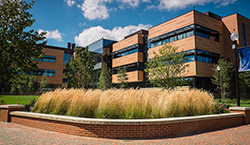������'s Nancy and G. Timothy Johnson Center for Science and Community Life Achieves LEED Gold Status

CHICAGO, IL (Feb. 10, 2015) – Completed last year, the $45 million at ������ was recently awarded LEED Gold certification by the U.S. Green Building Council, which establishes criteria for the construction of sustainable buildings.
“We are very pleased to have been awarded LEED Gold,” said David Parkyn, President of ������. “The building is not only esthetically beautiful, but also functions efficiently and plays an important environmental role. That’s especially rewarding on our urban campus, and consistent with North Park’s mission as a Christian institution and stewards of the environment.”
Through its achievement of LEED Gold status, ������ is able to provide the best environment for students, faculty, staff, and visitors, while also minimizing waste, reducing toxins, lowering potential energy bills and operating costs, and achieving healthier indoor air quality.
“LEED Gold is an outstanding accomplishment and shows ” said Susan Heinking, Vice President & Sustainability Leader at VOA Associates Inc., longtime architectural partners with the University.
As sustainable administrator, Heinking’s role was to facilitate the sustainable design throughout the design and construction process. "Each element—from the external shades on the facade allowing daylight in while blocking out heat gain, to the green roof that reduces building stormwater run-off—was selected to meet sustainability requirements," said Heinking.

Throughout the design process various stakeholders, which included scientists, faculty, staff and administrators, and students, gave input to the architectural team for the design of a building that would create a space for all students, optimize outdoor space and daylight, and meet sustainability goals.
Some of the sustainable features of the Johnson Center include: reducing heat island effect with green roofs and high albedo hardscapes; promoting alternative transportation methods; promoting ongoing building recycling; incorporating recycled and regional materials; and promoting healthy indoor environment via low emitting materials. Sustainable design and construction of the Johnson Center also means increased air filtration, increased air ventilation; and occupant comfort is increased via thermal comfort measures and lighting controls. Additionally, the building produces 30% water savings, 26% energy savings, and 75% waste diverted.
Use @npunews to . Learn more .

